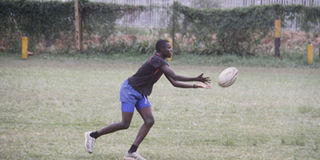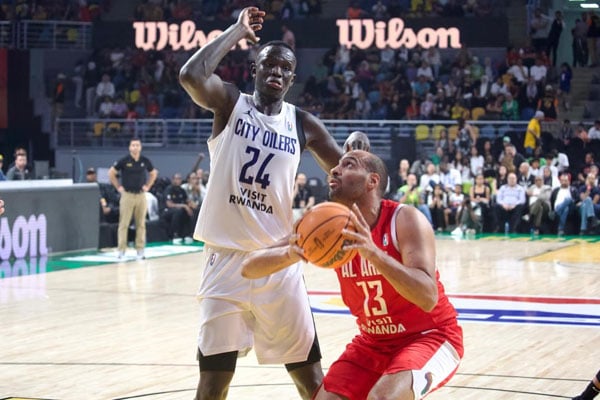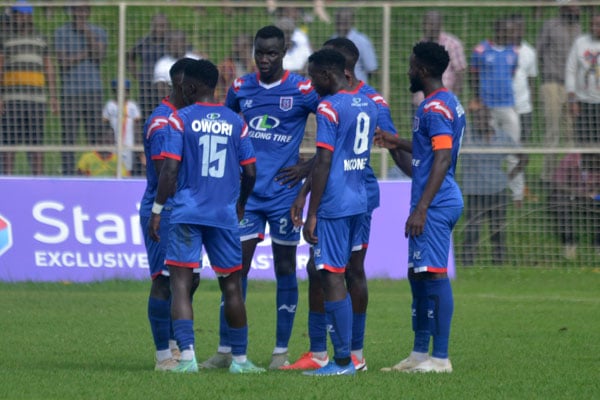Lady Cranes give a lesson on grassroots development

Auma shone for Uganda in Zimbabwe
Last week this column exhaustively covered the dark shadow that Uganda Rugby Union’s ineptitude has cast over the oval ball sport with specific reference to the Lady Cranes. Less discussed was the manner in which the Lady Cranes project has been pieced together. The broadness and totality of the project awes as much as boggles the mind.
Ugandan sport and short-termism are joined at the hip almost by default. So often, Ugandan sport officials are all too happy to place the cart ahead of the horse.
The good people in charge of the Lady Cranes have proven to be an exception to the rule. They have reminded us that there are other, more profound victories to be earned. Grassroots development has never been Ugandan sport’s cup of tea.
There is no great secret to the fact that Ugandan sport is all for ‘instant coffee.’ The pursuit of instant suc-cess has turned out to be the loose thread that unravels Ugandan sport.
Papering over cracks does not guarantee sustained success. The people behind the Lady Cranes project know this all too well.
Their project does not squat on quicksand because a bottom-up building process is at use. It was back in 2014 that an under-19 girls team was cobbled together and sent to figure in the Safari Sevens.
The short-term goal was to win the Safari Sevens, which the team indeed went on to do. This short-term goal, however, paled in comparison to what the brains behind the five-year project had in mind.
The mid-term goal was to have the youngsters blooded into the national sevens team. This too has been achieved. Samiya Ayikoru, Juliet Nandawula and Grace Auma were mainstays in the team that placed fourth in the recent Rugby Afrique women sevens.
The youngsters might have showed that they are mature beyond their years and highly methodical in their approach, but one anecdote captured their naivety.
When their coach, Helen Buteme, gave them a day off, the players popped eyes when they made a ball and played dodge ball.
The long term goal for Buteme and her other partners in crime is to have the team play at the 2018 Sevens World Cup as she did in 2009.
The cross-pollination process she has tactfully overseen by marrying the young impressionable players with seasoned campaigners like Charlotte Mudoola and Brenda Kayiyi has yielded dividends.
There is no surprise in that as blending youth and experience is a best practice. It is easier said that done though.
Another great thing that Buteme and company have done is widen the selection pool. It is not just Kampala-based.
This has allowed them to get their hands on some excep-tional talent dotting the country, and write a captivating storyline in the process. Others would do well to copy and paste their blueprint.
********************************************
Why Sserunkuma is running scared after an explosive start
When Milutin ‘Micho’ Sredojevic named a provisional squad from which he will select the matchday team for next month’s 2018 Fifa World Cup qualifier away to Ghana, the toll was devastatingly personal. No player was as seriously wounded by the outcome as Geoffrey Sserunkuma.
The KCCA FC striker had many shining lightbulb moments at the start of the season. Such was the vital impression Sserunkuma made -- winning the Fufa Super Cup for his club as well as catapulting it to the summit of the Uganda Premier League -- that Micho was compelled to include him in the matchday team for the 2017 Africa Cup of Nations qualifier against Comoros.
Goals have since dried up, leaving the thirty-something striker’s graph on a downward curve. The downward trajectory forced Micho’s hand. The Serbian wielded the axe this past week because “Sserunkuma is down with form (sic)”.
The barometer used to gauge the potency of a striker is goals. That Sserunkuma has not had many to toast to of recent is frighteningly apparent.
The goal drought has seen the striker with an unmistakable languid style lurch from moments of absolute faith to sheer doubt. Well, at least in the book of Micho.
The Cranes coach has hastened to make it categorically clear that he is not on a mission to vent his spleen. Players like Sserunkuma, Hassan Wasswa Mawanda and Robert Odongkara, who have failed to make the grade, could, Micho says, be considered for future assignments.
Uganda hosts a World Cup qualifier against Congo Brazzaville in November before travelling to the west coast of central Africa early 2017 to figure in its first Afcon finals since 1978. In between there will be a Cecafa Senior Challenge Cup defence in the Kenyan capital, but Micho has already expressed his willingness to blood young talent in that championship.
What this means in the grand scheme of things is that club football is the only tool Sse-runkuma has in his box to thin the fog of Micho’s doubts.
Mike Mutebi’s KCCA FC team picks itself. On paper, the team, which is shoe-horned with many attacking players, lines up as a 4-1-4-1.
The shape, however, changes when the team is in possession, with the fullbacks (Joseph Ochaya and Dennis Okot) taking up the space vacated by the inverted wingers (Brian Majwega and Vincent Kayizzi). The holding midfielder (Ivan Ntege) then drops back to make it a three-man backline with Timothy Awany and Habib Kavuma.
The only constant in the formation is a singular striker that is expected to plough the lone furrow. Until recent, Sserunkuma had a birthright to the position, and was expected to profit from the width that KCCA FC’s roving fullbacks are capable of providing.
But with the fullbacks having fallen on lean times -- certainly Okot -- Sserunkuma’s aerial prowess has hardly been a decisive factor.
While his great hold-up play has not made his position in the team untenable thus far, one cannot help but wonder what the signing of Robert Ssentongo brings to the table.
The possibility of KCCA FC playing through the middle with Paul Mucureezi and Muzamir Mutyaba linking up with Ssentongo could be too hard to pass up. If this does happen (and your columnist glumly hopes it does not), Sserunkuma will kiss goodbye his chances of playing at the Afcon finals.
This will be sad because Sserunkuma offers something markedly different from the usual running through the channels that Cranes strikers (Geoffrey Massa, Yunus Sentamu, Emma Okwi, Erisa Sekisambu and Hamis Kiiza) are renowned for. Plan B, anyone?




